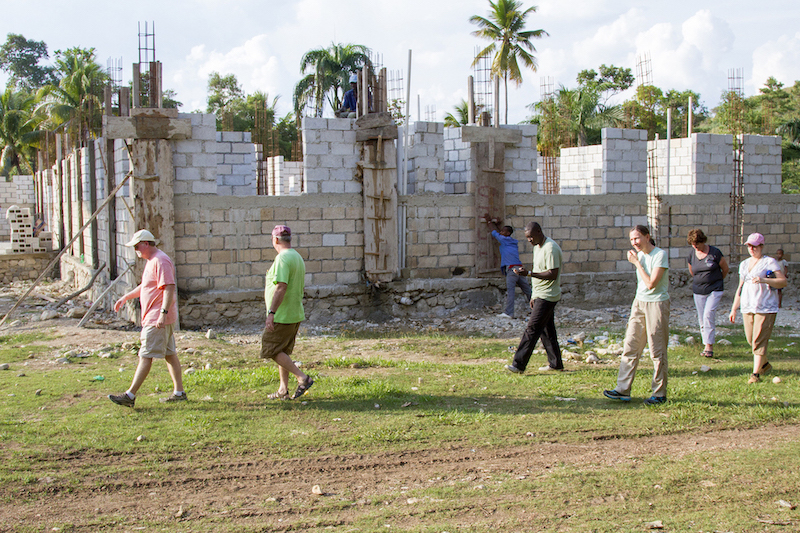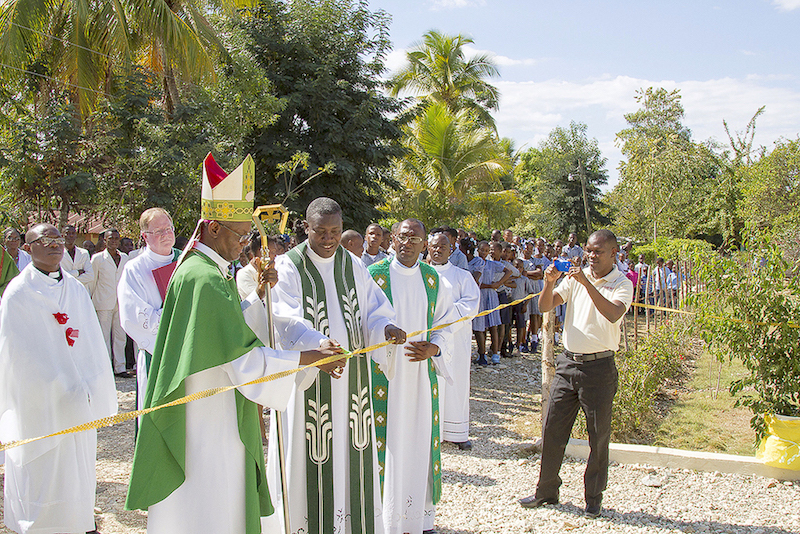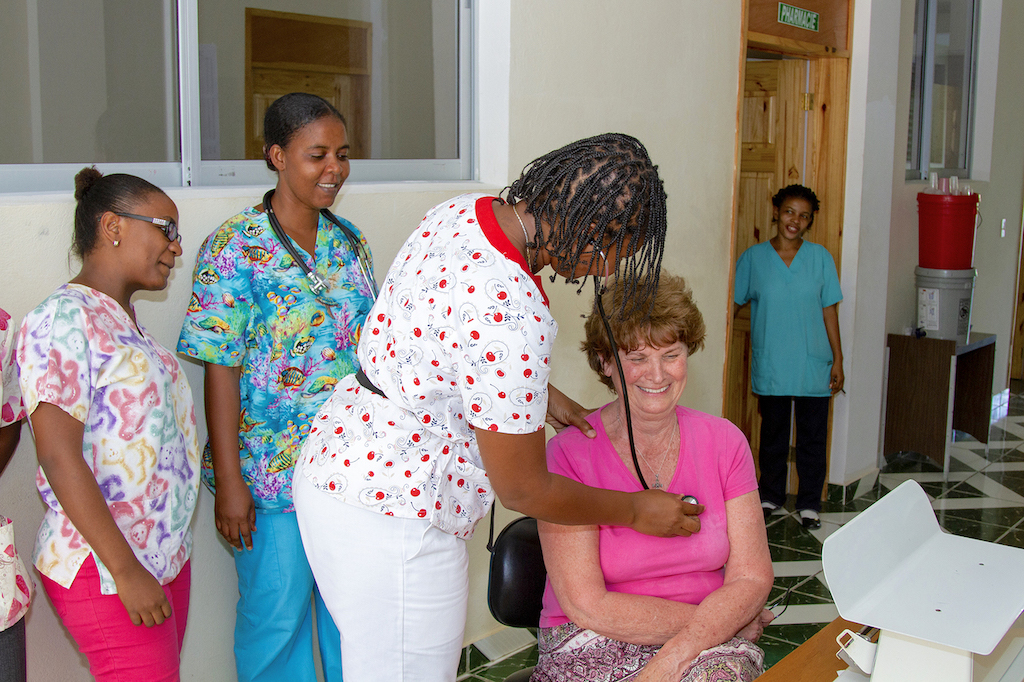In the Diocese of Hinche, Haiti, there is a critical need for healthcare assistance. For thirty years, the Diocese of Richmond has been helping the Diocese of Hinche, and the diocesan Haiti Healthcare Support Team (HHST) is a major part of that effort. One of HHST’s current projects is aligning parish ministries in our diocese with work done by the Diocese of Hinche.
Father Herald Jean of the Diocese of Hinche, writing to The Catholic Virginian, described the bleak outlook for the health care field in Haiti. “The economic means to help people are practically non-existent,” he said. “Haiti does not spend enough on healthcare. By way of illustration, Haiti is ranked 34th on the list of the 34 American countries that spend the least on health.”
Many parishes in our diocese provide support to a twin parish in Hinche as part of a Haiti twinning program. Approximately 759,000 people – more than half of them Catholic – live in the diocese, according to the Catholic Leadership Institute.
HHST is currently surveying local parishes to determine how they are improving healthcare with their twins and how the diocese can help address those needs.
“The greatest obstacle is the political and economic instability of the country, as well as insecurity in all its forms, particularly road insecurity,” said Father Jean. “These things bring frustration and misunderstanding on the part of the beneficiaries and of the professionals who work with us in the diocese.”
“The other obstacle,” he added, “is that the demands are higher than what we can offer in terms of materials and training.”
Meeting challenges
According to Elward, HHST chair and parishioner of Church of the Incarnation, Charlottesville, the goal of HHST is to enable Haitian clinics to be sustainable and able to operate on their own. To that end, medical interns must work a year in a community clinic in the country under supervision of a doctor.
“Haiti is the kind of place where the needs are very great,” said Dr. Anne Knasel, an HHST member and parishioner of Our Lady of the Rosary, Crozet. “It is really tragic when you think of the kinds of healthcare problems that people are suffering from that are either unknown in the United States – or, if they occur, they’re quickly solved.”
For example, the maternal death rate in the Diocese of Hinche is high, and neither emergency care nor acute first aid is common. Children are in need of deworming medicine, and women need iodized salt to prevent goiter.
Knasel described several services provided by HHST-funded clinics, including emergency treatment for injuries, prenatal and postpartum care, immunizations, and management of chronic illnesses, especially hypertension, anemia, diabetes and sexually transmitted diseases. Although the Richmond-based Midwives for Haiti makes it possible for pregnant women to remain in their villages, patients requiring more intensive care must travel to a larger city.

Unfortunately, many of the people living in the Diocese of Hinche live too far from the clinics in their area to seek services. The walk is often long, and most people do not own cars. In response to that need, the Diocese of Hinche has initiated a mobile program to serve far-reaching areas.
Father Jean also told HHST that his diocese’s most pressing need is the education of clinical staff. He hopes to have teleconference sessions with medical professionals in the U.S. to discuss mental health and chronic and infectious diseases. He is also looking for educational materials, said Tina Wandersee, director of the diocesan Office of Social Ministry.
Elward said HHST has already provided some education to doctors and healthcare clinicians via Zoom and hopes to do more.
‘Importance of faith’
Supporting a country with such a wide array of problems is both a blessing and a challenge. “Often in the U.S., I think you don’t get a chance to be as close to the patients as you are when you’re working in Haiti and talking with individual patients,” said Knasel.
That said, funding healthcare is sometimes difficult for our diocesan parishes. It can mean that they struggle to meet other needs of their twin parishes.

For example, St. Michael, Glen Allen, funded the construction of a clinic that opened in 2014 in the Haitian village of Dos Palais. St. Michael continues to finance the clinic’s operation and pay staff salaries, but Gary Sargent, who co-chairs the parish’s Haiti ministry with his wife Dawna, are hoping that another parish, church or organization will take over – at least partially. He noted that covering these healthcare costs requires about $50,000 per year, and the parish also needs funds for the church it helps support and for the school it runs.
Several other parishes are also helping with Haitian healthcare. For example, Our Lady of the Rosary and Charlottesville parishes Holy Comforter and St. Thomas Aquinas worked together to cover the cost of refurbishing a building to make a clinic in Saltadere. They also pay the salaries of 12 staff workers at the clinic.
One important program run by HHST is the medical assistance program, in which a team coordinates medication needs of various Haitian clinics. “Having one entity buy the drugs for all the clinics – rather than each clinic ordering its own – is more cost-effective,” Elward explained.
The Diocese of Hinche can buy medicine in bulk, can shop for the best price, knows which companies are reliable and has some leverage in placing orders. HHST is partnering with the Diocese of Hinche to build a climate-controlled facility where medications can be stored safely.
A future goal of the team is to facilitate the provision of laboratory medical equipment for clinics. Additionally, the team hopes to establish clinics in some of the schools so students can receive preventive healthcare.
Through it all, those involved see God at work.
“You kind of see the importance of their faith in keeping the Haitian people going,” said Knasel. “They have a problem that they’ve had for a long time, that hasn’t gone away, and you can’t do anything really to make it go away, either. And yet, the people are patient and accepting of whatever you can do for them.”
“Part of that comes from their spiritual base,” she added. “It really kind of reinforces what you should be at your base – trusting in God to help you to help them.”
Read more:
St. Bede, Williamsburg, continues Haiti ministry after death of Msgr. Joe Lehman

